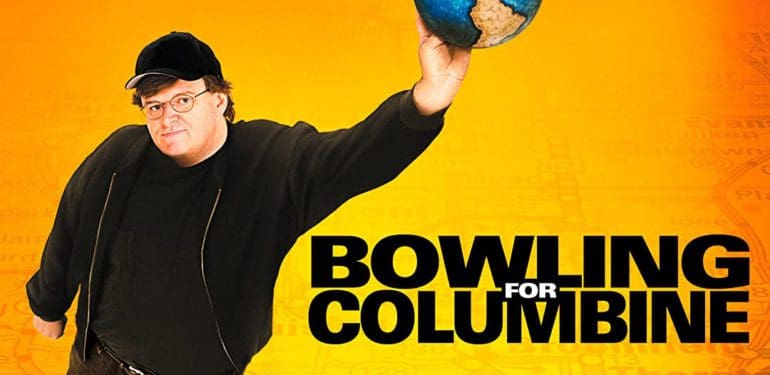This week, we’re talking about Michael Moore’s (somehow) Oscar-winning documentary, Bowling For Columbine. Released in 2002, it was a hit with audiences and critics alike, garnering rave reviews and grossing $58 million, which is a lot for a doc. Named for the tragic Columbine School Shooting that rocked the world in 1999, Bowling promised an exploration and explanation of America’s Gun Culture. But is it as incisive as we once thought? Does this film hold up nearly nineteen years after its release? Let’s reassess!
Arguments Against:
The Title
In my (admittedly nerdy) circle, this movie was the talk of Grade 11. I was in middle school when the tragic school shooting took place at Columbine in 1999. As someone who was glued to the news coverage for weeks’ worth of her formative years, I was eager to see a documentary about the massacre. But the title of this doc is a true misnomer, because it’s not really about Columbine; it co-opts the name of a famous tragedy, but provides little examination of it.. Sure, there’s a (supposedly) funny scene where Moore takes survivors of the shooting to K-Mart in a sarcastic attempt to return the bullets lodged inside them, but most of this (very long) movie is spent discussing other things, like killer bees and how the evening news sounds different in Canada.
I’m not sure if Moore cynically intended to drum up buzz for his film by using the Columbine name; however, his failure to research this tragedy adequately makes me wonder…
When he discusses Columbine, Moore hypothesizes the US Military/Industrial Complex is largely to blame (there’s an arms factory in the town of Columbine), a theory that is poorly fleshed out. I abhor militarism as much as the next person with a graduate degree in Gender Studies, but I feel like the likelier explanation for children shooting other children is America’s lack of gun control. But that’s just my opinion…
For a more accurate recounting of how Columbine happened – and some more plausibly guesses as to why – I recommend the You’re Wrong About podcast.
The Dishonest Filmmaking:
Documentary film isn’t supposed to be fiction. The standards of the genre dictate it must find facts and present them to its audience (and preferably honestly). The sacred covenant between documentarian and audience is that we will watch attentively in return for something that is true, or at least is trying to be. Unfortunately, Moore won an Academy Award for a documentary that doesn’t care about reality…
Nowhere are Moore’s polemical tendencies more obvious than when he visits Toronto, a city I have called home for most of my life. Moore uses Canada as a foil for America, which makes some sense, since we have fewer gun deaths per capita and we’re right across the border. However, rather than acknowledge Canada had a gun registry at the time of filming, he theorizes our country experiences less gun violence because it’s friendlier, and therefore feels safer. This feeling of safety makes Canadians less likely to shoot each other, or so the film implies.
The Toronto Moore represents is an idealized one. If this film were a work of fiction, this idealization would be acceptable, but it’s not. Moore suggests everyone in Toronto is so trusting of each other that no one even locks their doors. Of course, this is patently false. My family always locked our doors in 2002. So did our friends. We all lived within the city’s boundaries.
In another scene, Moore passes off a lovely co-op near St. Lawrence Market as Toronto’s lowest income neighbourhood. While Toronto admittedly has less poverty than some major American cities, less crime and have worked hard putting an end to family violence, it is not a Utopia. Systemic poverty and poor housing conditions are present in the Toronto of 2021, and the same was true in 2002.
The Film’s Utter Incoherence
Martin Luther famously provided 95 Theses explaining what was wrong with The Catholic Church. Well, in a two-hour film, Moore provides about five hundred and six theories about gun violence in America. He posits everything, from killer bees to bullying, is to blame. And while some of the causes he identifies are more plausible than others (Yes, the NRA is evil and lobbies against gun control), he spends so much time indulging grand theories about The Military/Industrial Complex that there’s little time left to explore how gun control works in other countries, and how it could save American lives…
Arguments In Favour:
Um…
Um, I genuinely can’t think of any. I tried really hard to brainstorm at least one saving grace, because it feels mean not to say anything nice. But I’m not a time traveller. I can’t go back to 2002 and make this documentary better…
The Verdict:
This movie is like fresh fish you paid a ton of money for, and promptly left in the back of your fridge to rot for three weeks. It is not worth rewatching. Spare yourselves! There are better texts about guns, some of which spend real time discussing the importance of gun control. I recommend the 2016 film Miss Sloane. It’s technically fiction, but it provides a lot more valuable information about how America could save lives by limiting access to firearms than Bowling For Columbine does…


